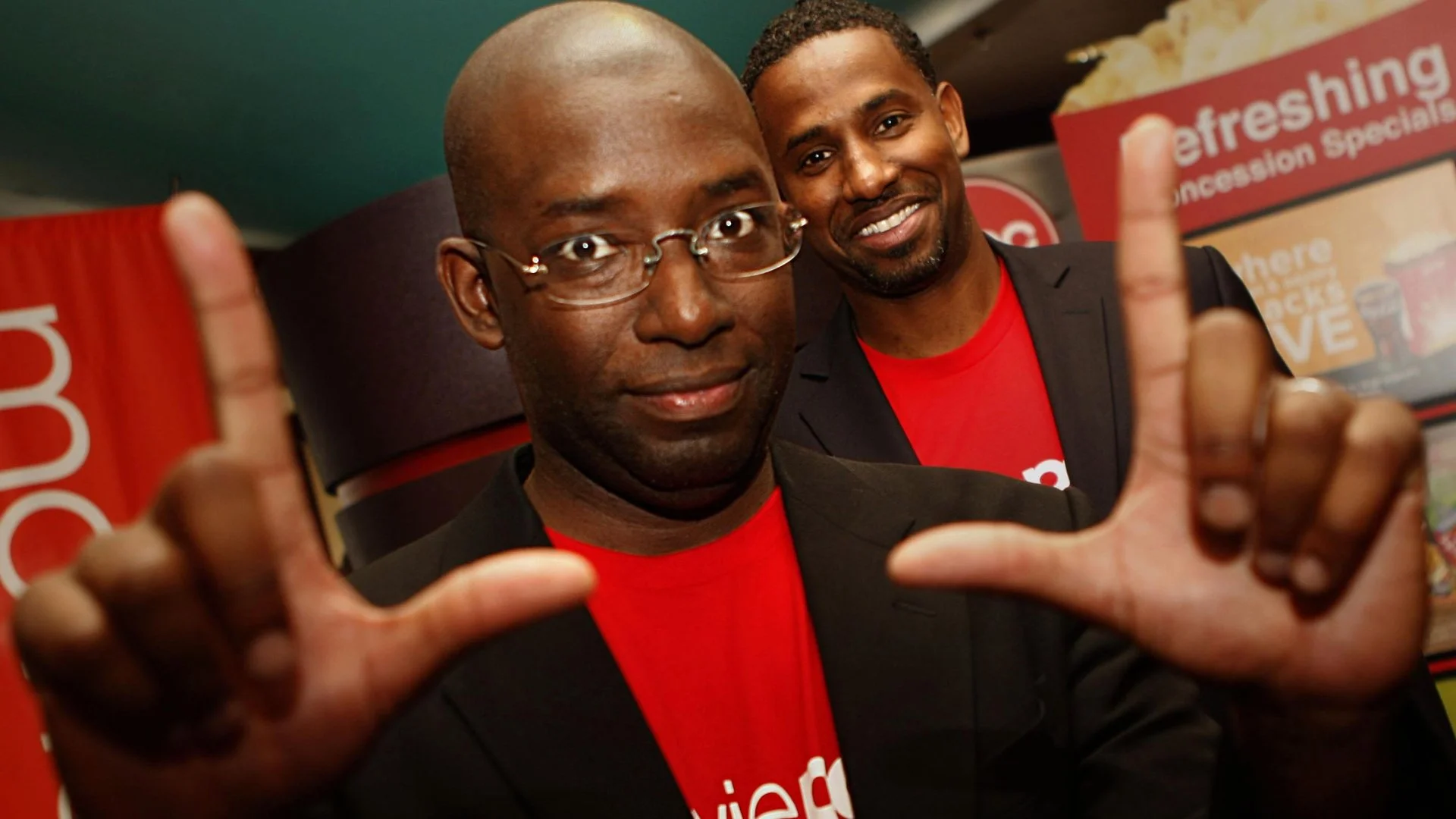'Moviepass, Moviecrash' Review: Moviegoing App’s Downfall Doc is like an Atlanta Episode | SXSW 2024
NR
Runtime: 1 Hr and 36 Minutes
Production Companies: Assemble Media, Business Insider, Tower Way, Unrealistic Ideas
Distributor: HBO
Director: Muta'Ali
Cast: Stacy Spikes, Hamet Watt, Ted Farnsworth, Mitch Lowe, Chris Kelly, Daymond John, John Fichthorn, Emmanuel Freeman, Sydney Weinshel, Omar Miscara
Release Date: N/A
SXSW 2024 Coverage
Where were you on July 26, 2018, when the MoviePass app crashed nationwide? You might’ve been trying to purchase a ticket to Mission: Impossible - Rogue Nation at your local theater, just like every other subscriber! I, however, was trying to buy a ticket to Teen Titans Go! to the Movies. Guess what? That was unavailable, too. During this past SXSW, that minor yet memorable traumatic experience activated a wavering dread when walking into Muta'Ali Muhammad's doc MoviePass, MovieCrash. The MoviePass downfall is one of the many reasons why I have trust issues. Like everyone who walked into that screening, I never looked up who created MoviePass. We were so blinded by the subscription services' $10 a month for unlimited movies deal that we never researched what was happening behind the scenes. With Stacy Spikes and Hamet Watt on the festival promo image and Spikes being the face of MoviePass' recent relaunch, I thought, "Oh, so this company was the biggest Black L in history." I was wrong.
In 2011, longtime film industry marketing veteran Stacy Spikes and his entrepreneur pal Hamet Watt launched MoviePass. Both wanted to make an affordable way for working-class cinephiles to see movies as ticket prices increased nationwide. They needed help to get investors and movie chains, mainly AMC, to buy into their business. Former Redbox CEO and their advisor Mitch Lowe stepped in and reworked the company's pricing model to gain more subscribers. In 2016, he was made CEO. Come 2017, Ted Farnsworth of Helios and Matheson Analytics swooped in. They bought a stake in MoviePass, and with their big ol' loan to the company came the infamous move to make the subscription service $10 a month for one movie per day, a deal so good to be true that it garnered over 3,000,000 subscribers. However, as the new model grew, Spikes and Watt snowballed into a coup beyond their control that changed MoviePass' image for the worse.

It’s surmised that MoviePass was initially a Black business and Stacy Spikes was Mr. MoviePass. He's not just the man behind the card, but the beating heart that brought everything together. There wouldn't be a MoviePass without him, and Watt and Muta'Ali gave the founder his flowers. The film props up Spike's extensive resume, whose experience goes back to the ‘90s. Quickly becoming the head of marketing at Miramax, responsible for Scream's successes, working for Sundance in a leadership role, and becoming the founder of the still-operational Urbanworld Film Festival in NYC, Spikes's work within the industry preceded him and just about everyone else featured – primarily Lowe and Farnsworth. In the conversations with his peers, it's clear that Spikes is an earnest, endearing guy, sincere about movies and the people they attract, understanding their cultural and social significance.
The film shows that MoviePass' rise was an uphill battle. Accessibility was the main objective when launching the app. Yet because Spikes and Watt failed the paper bag test in the eyes of investors, their options for growth were limited. As each detail recounting these events comes to light, Muta'Ali transparently discusses the racist foundations in every field, that no matter how far your career takes you, the grand inherent discrimination against Black entrepreneurs within practically every field limits their opportunities.
The moment Mitch Lowe of Redbox and Helios and Matheson CEO Ted Farnsworth step in, MoviePass, MovieCrash spirals into something of an unreleased Atlanta episode, for it's a karmic cautionary, eye-opening tale about a Black business being co-opted by egotistical, heartless white dudes. The more influence the new guards had on the app's image, the further Spikes and Watt went to the back of the bus, and the absurdism was relentless. It came to a point that Lowe and Farnsworth were going to talk shows promoting the app and claiming, "Oh yeah, we founded the app," and nobody did their research and called them out on their bullshit.
They took a page out of Billy McFarland of Fyre Fest's playbook. Lowe and Farnsworth were burning through the money they needed, hiring models and influencers to promote the app, funding parties, and painting their logo on helicopters and ice sculptures. Meanwhile, customer service was slaving away to handle user issues with the app's functionality. It's so damning it deepens the Atlanta-styled surrealist-meets-absurdist nature. I was waiting for the "written by Stephen Glover and Donald Glover" credit by the end.
The dirtier the founders are, the more the fury rolls down your spine as you anticipate the app's inevitable downfall at the hands of these schmucks. Despite the highlights anyone who once had that red card in their wallet knows of, the stranger-than-fiction nature comes from yanking the curtain off the heartless and sometimes criminal activity Lowe and Farnsworth did to its users while snowballing its success for their gain.
The point of white privilege and greed comes across when Mitch Lowe, somehow still a free man, serves as a talking head rebutting all the efforts and claims thrown against him. His responses make you want to punch him in the face or walk away saying, "Fuck Mitch Lowe. All my homies hate Mitch Lowe." His comments showcase his lack of remorse or regret for his criminal actions.
While it’s not supposed to be a commercial for the new reinvention of MoviePass, the resounding misery that Spikes endured, seeing his baby mutilated to the point of bankruptcy, is enough to make me want to redownload MoviePass and give it a fair shot again. I won't because the AMC A-List owns my soul, but morally speaking.

Strengthened by its commentary about racial inequality in Black entrepreneurship and white privilege, MoviePass, MovieCrash is an eye-opening history lesson behind the subscription service designed to be great but co-opted to fail.
Rating: 4/5 | 81%


